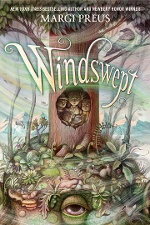Five questions for Margi Preus
In Windswept (Amulet/Abrams, 9–12 years) by Newbery Honoree (for Heart of a Samurai) Margi Preus, children are kept indoors to protect against wielders of cataclysmic weather-related weaponry. An intrepid band of youngsters sets out to fight these “Powers-That-Be.” The tale is steeped in Norwegian folklore, with a satisfying mix of “slapstick alongside real suspense; and language being bent, re-purposed, and enjoyed for its own deliciousness” (from the September/October 2022 Horn Book Magazine review).
In Windswept (Amulet/Abrams, 9–12 years) by Newbery Honoree (for Heart of a Samurai) Margi Preus, children are kept indoors to protect against wielders of cataclysmic weather-related weaponry. An intrepid band of youngsters sets out to fight these “Powers-That-Be.” The tale is steeped in Norwegian folklore, with a satisfying mix of “slapstick alongside real suspense; and language being bent, re-purposed, and enjoyed for its own deliciousness” (from the September/October 2022 Horn Book Magazine review).
1. How did the idea for this story come about?
 Margi Preus: I started thinking about this story in the early part of 2020 when the world was shutting down because of the pandemic. Simultaneously, Minnesota (where I live) was having the windiest year on record, with gusts of thirty miles an hour or more during a time that is usually cold but generally still. There was a certain apocalyptic feel to the wind, the pandemic, and, okay, also the political situation. Although there were all kinds of things to write about, like a lot of other writers I know, I found it difficult to write, and so I didn’t. Instead, I read fairy tales. Especially Norwegian ones. One of them, “The Three Princesses in the Mountain Blue” (or “Blue Mountain,” in some translations) is about three princesses who are not allowed to go outside until they are fifteen years old, lest a snow flurry come and take them. Which of course is what happens. That story gave me a way into Windswept, and other fairy tales led me the rest of the way through.
Margi Preus: I started thinking about this story in the early part of 2020 when the world was shutting down because of the pandemic. Simultaneously, Minnesota (where I live) was having the windiest year on record, with gusts of thirty miles an hour or more during a time that is usually cold but generally still. There was a certain apocalyptic feel to the wind, the pandemic, and, okay, also the political situation. Although there were all kinds of things to write about, like a lot of other writers I know, I found it difficult to write, and so I didn’t. Instead, I read fairy tales. Especially Norwegian ones. One of them, “The Three Princesses in the Mountain Blue” (or “Blue Mountain,” in some translations) is about three princesses who are not allowed to go outside until they are fifteen years old, lest a snow flurry come and take them. Which of course is what happens. That story gave me a way into Windswept, and other fairy tales led me the rest of the way through.
2. How did you decide which “Other Times” troubles to reference?
MP: I wanted to — maybe I needed to — imagine a time on the other side of climate catastrophe when Earth might be starting to heal. What might that look like? What problems might remain, human nature being what it is? Of course, the troubles of the “Other Times” are the troubles we face right now: the effects of climate change, gun violence, consumerism, book banning, and our inability to deal substantively with these and other problems, consequently leaving them for younger and future generations to solve.
3. What is your favorite Norwegian fairy story and why?
MP: Mmm. I love so many of them. I have a very great fondness for “East of the Sun and West of the Moon,” the story that helped me find my way through my novel West of the Moon. Like most girls in Norwegian stories, the girl in that story is resourceful, compassionate, brave, clever, and tenacious, although no one beats the tenacity of the girl in “The Twelve Wild Ducks” who, to release her twelve brothers from their enchantment, makes twelve suits of clothes out of thistledown. Nor does anyone beat the cleverness of the girl in “The Squire’s Bride” who manages to trick the unsavory squire into marrying a horse. Or the outrageousness of the girl who turns troll in “The Companion.” Or the princess “who was such a liar no one could equal her.” Or the wily intelligence and sly humor of “The Three Aunts.” Oh, they’re all good! Impossible to pick one.
 4. Did anything in the art surprise you?
4. Did anything in the art surprise you?
MP: The art itself surprised and continues to surprise and delight me! The cover and the illustrations are so fine and fantastical and playful. In the way of fairy tales, Armando Veve’s illustrations push one’s imagination a little farther than it might ordinarily go — and in this case carry many moments in the story along a little farther than the text. That troll disguise on page 185, for instance. I couldn’t have invented that!
5. What do you hope readers take away?
MP: Well, I hope readers have a lovely reading experience. That’s the main thing. It would also be wonderful to think that my story might offer the same assurance that fairy tales do — that in a sometimes dark and scary world, if we accept the advice and gifts offered, and face life’s challenges with courage and compassion toward others, we can overcome all obstacles — even impossible ones — and maybe things will turn out all right in the end.
From the September 2022 issue of Notes from the Horn Book.
RELATED
ALREADY A SUBSCRIBER? LOG IN
We are currently offering this content for free. Sign up now to activate your personal profile, where you can save articles for future viewing.






Add Comment :-
Be the first reader to comment.
Comment Policy:
Comment should not be empty !!!